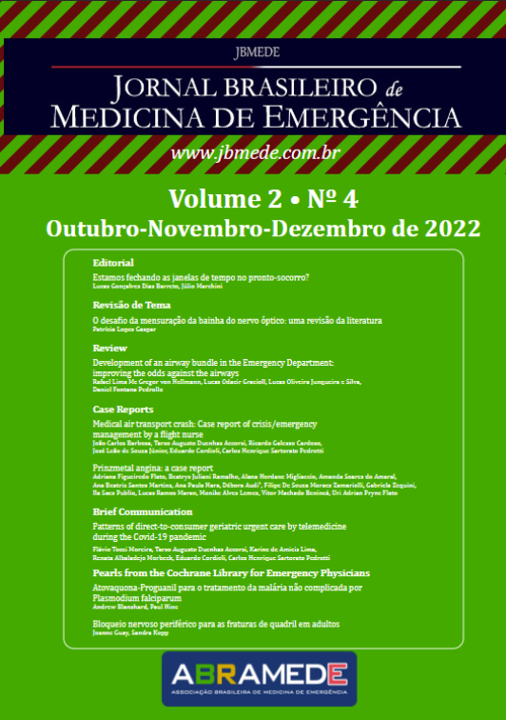Development of an airway bundle in the Emergency Department: improving the odds against the airways
Main Article Content
Abstract
Proficiency in airway management is a fundamental competence of every emergency physician. However, the scenario and patient conditions are often not ideal, increasing the procedural risk. The development of an airway bundle, including an airway trolley with separate drawers, an airway approach plans organized by colors and steps, a checklist and cognitive aids, aims to reduce the morbidity and mortality of the procedure in a scenario where anatomical, physiological and psychological factors tend to cause more difficulties than any other place in the hospital.
Article Details

This work is licensed under a Creative Commons Attribution 4.0 International License.
References
Cook TM, Woodall N, Frerk C; Fourth National Audit Project. Major
complications of airway management in the UK: results of the
Fourth National Audit Project of the Royal College of Anaesthetists
and the Difficult Airway Society. Part 1: anaesthesia. Br J Anaesth.
;106(5):617-31.
Cook TM, Woodall N, Harper J, Benger J; Fourth National Audit
Project. Major complications of airway management in the UK:
results of the Fourth National Audit Project of the Royal College of
Anaesthetists and the Difficult Airway Society. Part 2: intensive care
and emergency departments. Br J Anaesth. 2011;106(5):632-42.
Cook TM, Scott S, Mihai R, Litigation related to airway and
respiratory of anaesthesia: an analysis of claims against the NHS
in England 1995-2007. Anaesthesia. 2010;65(6):556-63.
Peterson GN, Domino KB, Caplan RA, Posner KL, Lee LA,
Cheney FW. Management of the difficult airway. Anesthesiology.
;103(1):33-9.
Chrimes N. The Vortex: a universal “high-acuity implementation
tool” for emergency airway management. BJA. 2016;117(1):i20-7.
Frerk C, Mitchell VS, McNarry AF, Mendonca C, Bhagrath R, Patel
A, et al.; Difficult Airway Society intubation guidelines working
group. Difficult Airway Society 2015 guidelines for management
of unanticipated difficult intubation in adults. Br J Anaesth.
;115(6):827-48.
Higgs A, McGrath BA, Goddard C, Rangasami J, Suntharalingam
G, Gale R, et al.; Difficult Airway Society; Intensive Care Society;
Faculty of Intensive Care Medicine; Royal College of Anaesthetists.
Guidelines for the management of tracheal intubation in critically
ill adults. Br J Anaesth. 2018;120(2):323-52.
ANZCA, Professional Document PS 56: Guidelines on Equipment
to Manage a Difficult Airway during Anaesthesia, ANZCA, West
End, Australia, 2012, http://www.anzca.edu.au/documents/ps56-
-guidelines-on-equipment-to-manage-a-diff.pdf
Fuchs, A, Haller M, Riva T, Nabecker S, Greif R, Berger-Estilita J.
Translation and application of guidelines into clinical practice: A
colour-coded difficult airway trolley. Trends in Anaesthesia and
Critical Care. 2021;40:46-54.
Bjurström MF, Bodelsson M, Sturesson LW. The difficult airway
trolley: a narrative review and practical guide. Anesthesiol Res
Pract. 2019;2019:6780254.
Sherren P, Tricklebank S, Glover G. Development of a standard
operating procedure and checklist for rapid sequence induction in
the critically ill. Scandinavian Journal of Trauma, Resuscitation and
Emergency Medicine. 2014;22:41.
Byrne T. Alfred ICU Intubation Checklist. 2017 [cited 2022 Dez 21].
Available from: https://intensiveblog.com/alfred-icu-intubationchecklist/
Forristal C, Hayman K, Smith N, Mal S, Columbus M, Farooki
N, et al. Does utilization of an intubation safety checklist reduce
omissions during simulated resuscitation scenarios: a multi-center
randomized controlled trial. CJEM. 2021;23(1):45-53.
Chrimes N, Fritz P. Vortex Approach. [cited 2022 Dez 21]. Available
from: http://vortexapproach.org
Mort TC. The incidence and risk factors for cardiac arrest during
emergency tracheal intubation: a justification for incorporating
the ASA Guidelines in the remote location. J Clin Anesth.
;16(7):508-16.
Langvad S, Hyldmo PK, Nakstad AR, Vist GE, Sandberg M.
Emergency cricothyrotomy - a systematic review. Scandinavian
Journal of Trauma, Resuscitation and Emergency Medicine.
;21(1).
Reason J. Education and debate Human error: models and
management. BMJ. 2000;320:768-70.
Flin R, Fioratou E, Frerk C, Trotter C, Cook TM. Human factors in the
development of complications of airway management: preliminary
evaluation of an interview tool. Anaesthesia. 2013;68(8):817-25.
Cook TM. Strategies for the prevention of airway complications - a
narrative review. Anaesthesia. 2018;73(1):93-111.
Schnittker R, Marshall S, Horberry T, Young KL. Human factors
enablers and barriers for successful airway management - an indepth
interview study. Anaesthesia. 2018;73(8):980-9.
Chrimes N, Bradley WP, Gatward JJ, Weatherall AD. Human
factors and the ‘next generation’ airway trolley. Anaesthesia.
;74(4):427-33.
Does colour-coded labelling reduce the risk of medication errors?
Can J Hosp Pharm. 2009;62(2):154-6.
Heffner AC, Swords DS, Neale MN, Jones AE. Incidence and factors
associated with cardiac arrest complicating emergency airway
management. Resuscitation. 2013;84(11):1500-4.
O’Sullivan E, O’Sullivan M, Lavelle A. Five-year audit of
adherence to an anaesthesia pre-induction checklist. Anaesthesia.
;77(9):1065.
Dubash R, Govindasamy LS, Bertenshaw C, Ho JH. Debriefing in
the emergency department. Emerg Med Australas. 2021;33(5):922-
Douros G. Learning means changing: What’s changed? Emerg Med
Australas. 2021;33(5):928-29.
de Carvalho CC, Silva DM, Lemos VM, Dos Santos TGB, Agra
IC, Pinto GM, et al. Videolaryngoscopy vs. direct Macintosh
laryngoscopy in tracheal intubation in adults: a ranking systematic
review and network meta-analysis. Anaesthesia. 2022;77(3):326-38.
Hansel J, Rogers AM, Lewis SR, Cook TM, Smith AF.
Videolaryngoscopy versus direct laryngoscopy for adults
undergoing tracheal intubation. Cochrane Database Syst Rev.
;4(4):CD011136.
Driver BE, Prekker ME, Klein LR, Reardon RF, Miner JR, Fagerstrom
ET, et al. Effect of use of a bougie vs endotracheal tube and stylet
on first-attempt intubation success among patients with difficult
airways undergoing emergency intubation: a randomized clinical
trial. JAMA. 2018;319(21):2179-89.
Janz DR, Semler MW, Joffe AM, Casey JD, Lentz RJ, deBoisblanc
BP, et al.; Check-UP Investigators*; Pragmatic Critical Care
Research Group. A Multicenter Randomized Trial of a Checklist
for Endotracheal Intubation

